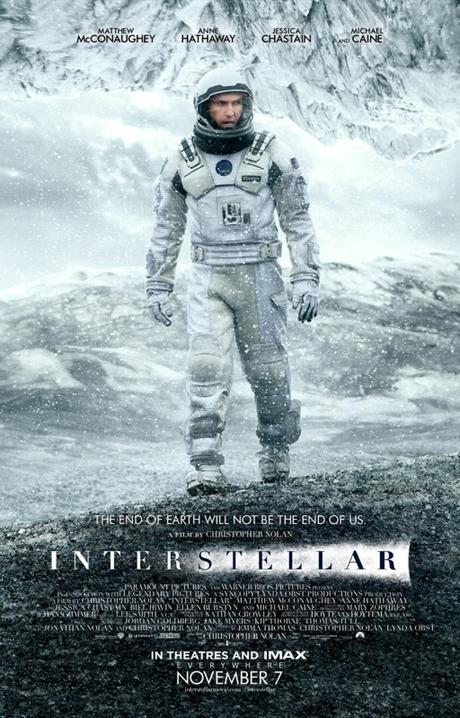
In the year 2000, Christopher Nolan broke out with a brilliant neo noir ("Memento") that defied the conventions of linear storytelling. In 2005, he revamped the superhero genre with his Dark Knight trilogy, layering it with real-world gravitas. Since then, this writer-director has become a household name for his originality, making popular films that dared to challenge audiences. With his latest film "Interstellar", he has once again stepped it up a notch. It's his most ambitious project to date, delving into complex notions of space, time and gravity.
"Interstellar" is set in the not too distant future. It's a time when the world is in a major crisis. People are running out of food, as a mysterious dust called "blight" has made almost every crop go extinct. The land is therefore in need of good farmers, forcing all of the resources to go towards an agriculture-focused society. Cooper (our protagonist) is one of the best farmers around, but he's not satisfied with his lot. Formerly an engineer with space-bound aspirations, he longs for the day when he will get the chance to use his best skills once more. His intellect has also rubbed off on his 10-year old daughter Murphy, an inquisitive mind who's obviously being held back by the dumbed-down educational system. One day, a mysterious event takes place in her bedroom that gives them renewed hope. It leads them to a secret location that eventually leads Cooper on a risky mission to the far reaches of the galaxy. His mission - to find a viable new planet and save the human race.
This Cooper character is played by Matthew McConaughey, an actor who seems like he was born to play this role. With his Texan accent and effortless air of confidence, he's instantly believable as someone who could be both a successful farmer and an engineer/astronaut. He rattles off the character's numerous all-important monologues with ease, mostly lamenting the complacency of mankind. It therefore comes as no surprise then, that he grabs the opportunity to test our limits once more. He's aware of the sacrifice (leaving his family behind) but in his mind, it's necessary.
The subsequent adventure is a major leap of faith, much like the actual filmmaking itself. Both Cooper and Nolan are men who want to explore new horizons. The result is a film that's staggering in its ambition, with monumentally high stakes that we can't even begin to fully comprehend. Cooper's mission takes us to new galaxies, where time works in different ways due to gravitational forces. Wormholes and blackholes are but a few of the highly intellectual concepts found in the film, brought to vivid life through the Hoyte Van Hoytema's astonishing cinematography and the stunning visual effects from the talented artists at Double Negative.
Under all the visual grandeur is an engrossing story too, no easy feat considering how overwhelming it sometimes is. "Interstellar" is literally a race against the clock (if Cooper doesn't complete his mission in time, all of humanity may have already died), with a high likelihood of failure at every turn. If there's one criticism that I'd agree with then, it's that the film sometimes seems too grandiose. With some awkward, flowery monologues and far-fetched acts of impossible triumphs, it projects a high level of arrogance. You can easily picture Christopher Nolan marveling at his creation (co-written with his brother Jonathan), not realizing how bleak it actually is. Hans Zimmer's emphatic score and the characters' motivations are reminiscent of Spielberg (think "Close Encounters of the Third Kind") but make no mistake, there's a dark dystopia at its core. As a result, its denouement carries a feeling of relief rather than the joyous satisfaction that's clearly intended.
Yet despite its flaws, I'm reminded of a recent conversation involving Paul Thomas Anderson (an ambitious director in his own right). It was an hour-long talk that was organized by the recent New York Film Festival and recently aired on the Film Society Lincoln Center's "The Close-Up" podcast. In it, he explained how he views "emotional logic" as more important in filmmaking than the plausibility of the plot. It's a view that seems to be reflected in Nolan's work here, as the script has already been derided as excessively convoluted. For me however, "Interstellar" successfully makes up for it with its beating heart. Much of the film's power comes from its exploration of the film's myriad human relationships. Among all the science is a central defining thesis that love is a powerful force that transcends all. It's admittedly corny, but through the performances of Jessica Chastain, Anne Hathaway, Mackenzie Foy and Matthew McConaughey, it was acutely, heartbreakingly felt.
In the end, "Interstellar" may not be as satisfying as Christopher Nolan's other films, but he remains a vital presence in contemporary "popcorn cinema". There are moments in this film that gave me a visceral rush that is unmatched by other blockbusters. Christopher Nolan is known as a man who holds the cinematic experience in high regard and it definitely shows. Go see it on the biggest screen possible and have a grand time.
In terms of Oscar, "Interstellar" feels like such a wildcard. It could be a big player or it could be mostly dismissed across the board. My gut feeling is that the Academy members will respect its ambition. As such, I'm just gonna throw it all out there and hope something sticks. My prediction is that the film will be in contention for nods in Best Picture, Best Director, Best Original Screenplay, Best Editing, Best Production Design, Best Sound Editing, Best Sound Mixing, Best Visual Effects. My reasoning is, if you love the film enough to put it high on your Best Picture ballot, then you were probably impressed by all of these aspects as well. Don't quote me on that though.
